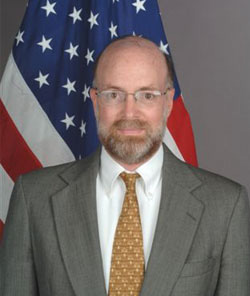U.S. condemns Eritrea for "destabilizing" role
 ASMARA (Reuters) - The United States accused Eritrea on Monday of working to destabilize the Horn of Africa region and urged President Isaias Afwerki to bring a halt to what it called a threat to international peace.
ASMARA (Reuters) - The United States accused Eritrea on Monday of working to destabilize the Horn of Africa region and urged President Isaias Afwerki to bring a halt to what it called a threat to international peace. The U.N. Security Council, which last December imposed the sanctions, accuses Asmara of providing funds and weapons to Islamist insurgents in Somalia where 21,000 people have been killed in violence since the beginning of 2007.
Aimed at the country's leaders, the sanctions include an arms embargo, a freeze on assets and travel bans on individuals and firms to be designated by a sanctions committee.
"The United States calls on President Isaias to immediately end Eritrea's destabilizing activities in the Horn of Africa," the U.S. Embassy said in its statement.
"Eritrea's actions in Somalia and Djibouti threaten international peace and security and contribute to a dire humanitarian crisis."
Relations between Eritrea and neighboring Djibouti remain hostile. In June 2008 a dozen Djiboutian soldiers were killed in a clash, and last October Djibouti accused Eritrea of training militias to carry out sabotage in its territory.
Eritrean officials deny all accusations relating to Somalia and Djibouti and have called on the U.N. to produce evidence and offer an independent platform on which to respond. They say that without this the sanctions are illegitimate and illegal.
Asmara also accuses the international community of a double standard, pointing out that Somalia is rife with U.S. munitions that arrive by the planeload.
"U.N. Sanction 1907 is an African-led initiative and the United States commends the African Union and Intergovernmental Authority on Development," the U.S. embassy said. "The United States supports the adoption of this important resolution."
DEMONSTRATIONS
Pro-Eritrean supporters gathered in some Western capitals to protest the U.N. resolution, which they say is the latest insult in a long history of western persecution.
Eritrea's state-run media is running a sustained campaign charging the United States with masterminding the U.N. sanctions imposed on it and says Washington wants to control the whole Horn of Africa region.
(Editing by Michael Roddy)


![[AIM] Asmarino Independent Media](/images/logo/ailogo.png)